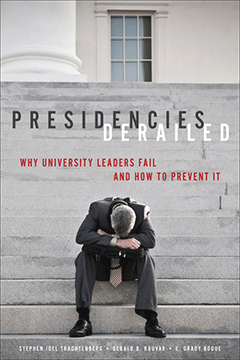By William M. Chace
This short monograph, co-authored by no fewer than seven experts, aspires to give helpful advice to anyone now in a university leadership position or seeking one. Focusing not on successes but on failures, it isolates six forces that “derail” university presidents: ethical lapses, poor interpersonal skills, inability to lead key constituencies, difficulty adapting (to campus culture), failure to meet organizational objectives, and board of trustee shortcomings.
The book diligently studies these forces by seeing how they can explain presidential failures at four dissimilar kinds of institutions: private liberal arts colleges, public institutions offering master’s degrees, public research universities, and community colleges. The authors offer no surprises as they specify the kind of virtues, personal as well as public, needed to avoid “derailments”: self-knowledge, understanding of various and differing constituencies, courage in the face of adversity, honesty, modesty, an instinct for leadership, skill in adjusting to new challenges, and resolve. Such wisdom as the book offers can perhaps be summed up by one sentence, it being no less true for being a truism: presidents “must first know themselves, and then they must be adept at understanding the world around them.”
It’s hard to imagine anyone now occupying a presidential office who would not happily agree. But such an exemplary virtue, everywhere honored in the abstract, is often unattained by presidents because of the kind of ordinary human defects to which we all are heir. What “derails” presidents is likely what can derail all of us. Presidential failure just happens to be more conspicuous.
The value of this book rests, then, not in its various maxims and bland observations but in some twenty pages that relate with telling detail and painful drama two real failures—that of William Frawley, who served from 2006 to 2007 as the president of the University of Mary Washington, and of Michael Garrison, who served from 2007 to 2008 as the president of West Virginia University. These two unlucky individuals brought with them determination to do well, considerable intelligence, an understanding both of people and complex organizations, a prodigious work ethic, and a devotion to higher education. And yet each lasted no longer than a year. There is no doubt that Frawley and Garrison would, when in office and now today, fully endorse each and every one of the virtues the seven authors extol.
In his own candid and wrenching account, Frawley failed because he carried with him into office a pre-existing undiagnosed depression that he had self-treated for 45 years by compulsive work and then alcohol. But during those years he had put together a record of academic work of high quality, award-winning teaching, and distinguished administrative achievements. In the glare of public life, however, he was charged with two DUIs in his first and only presidential year. That brought him down with a force so great that he was dismissed without severance pay and even his e-mail account was shut down. Now a survivor but one with many tortured memories, he says, “the only thing that saves you in the end—is honesty.” About the virtue of honesty, all seven authors are in agreement.
In the case of Michael Garrison, it is impossible to see that his resignation after one year was owing to any failure on his part. Indeed, his “derailment” can be traced directly to the fact that he, a trained lawyer and government official of considerable distinction, had no administrative experience in higher education. He knew that; so did those trustees who appointed him. What he did not know was that those trustees were weak and in disarray. During his months in office, he worked hard, made necessary changes, and even some faculty members, at first suspicious, grew to respect him. By rightly forcing an outgoing football coach to honor a contract with the university, he faced public hostility. By the end of the year, he became embroiled in a controversy about the provisions of an MBA degree program that he correctly believed deserved a full audit and clarification. More hostility.
What, then, to learn from this account, that of a president who seemed to know himself, was honest with others, was purposeful and industrious, and respected the culture of the institution? The authors apparently do not know: “Garrison’s essay is not intended to help a reader decide whether Garrison was guilty of any lapse in judgment.” Not only is there no evidence of any lapse of judgment; there is no evidence of any other kind of failure. Garrison could stand the heat of the kitchen, the board could not. In the end, they told him that while he was excused from any blame for his decisions and while they approved of his conduct, they “were just sick and tired of this issue and reading about the board in the paper.”
Garrison was “derailed” not because he lacked the virtues championed again and again by the authors. He fully possessed such virtues but they could not save him. Indeed, they seem to have placed him in jeopardy. That is the puzzle of virtues: warmly appealing as principles, painfully difficult in practice. Despite what the authors say about them, they are never enough.
William M. Chace is President and Professor of English Emeritus at Emory University.




